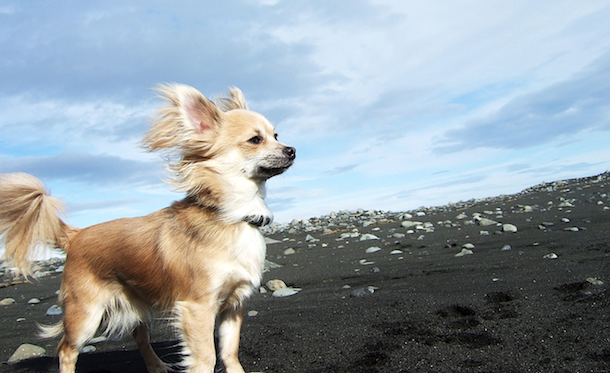
Living on a large orchard in upstate New York, my family always got big dogs. We had a Golden Retriever when I was born, followed by a chow, and until last month, a Labrador Retriever.
When I was 18, I adopted a Beagle, who died in mid-January. Soon after he died, our family acquired two dogs weighing less than 25 pounds, one of which was a chihuahua.
I’ve been very lucky to have friend who knows all about small dogs. She came to my apartment to meet my new Chihuahua and quickly realized that I had no idea what I was doing with my little girl!
It doesn’t seem to matter how educated you are about dogs, you cannot really appreciate what “small dog syndrome” is until you have a little dog acting like a 60-pound beast.
As a trainer, I knew I would not let my Chihuahua, Addisen, tell me what to do and to make sure to set the same standards as with my bigger dogs. Six months after adopting my Chihuahua, I am here to admit that I am a victim of small dog syndrome.
Teeny Terror
“Small dog syndrome” describes the personality that smaller dogs develop where they feel they can beat the snot out of anything bigger, but really can do little harm.
Along with this Napoleon complex, small dogs tend to get away with many more things than large dogs. Small dogs that exhibit bad behavior appear to be less dangerous and often less of a nuisance than their bigger cousins. Whether it’s a product of their genetics or something that we inadvertently foster in our pets, small dog syndrome can be annoying to the owner as well as to other people and their dogs.
To avoid small dog syndrome, you should try to recognize when you are allowing your tiny pup to get away with unruly behaviors. Just imagine that your dog is 50 pounds heavier. You wouldn’t want that heavier dog to jump all over you, pull you over on the leash and greet strangers rudely.
Assert yourself as more as a confident leader. That will get your dog, no matter the size, to respect you — and slowly that annoying small dog syndrome will dissipate.
Some Advice
Consider the following:
- Do not carry your dog everywhere. I made the mistake of carrying Addisen into a group dog training class that Addisen and I were attending. The trainer immediately had me put her down and explained that offering my dog an elevated view of the other dogs gives her the idea that she is in charge. Not only does constantly carrying your dog lead to behavioral issues, but it deprives them of exercise.
- Do not allow your small dog to walk all over you — literally. My friend with the small-dog knowledge has a strict rule in her house (which has three little dogs) that they are not allowed on laps unless invited.
- Do not hand-feed your pet. Unless there is a medical reason your dog can’t eat from a bowl, don’t do it.
Small dogs do need some special consideration. Addisen is 12 pounds, and when someone towers over her and tries to say hello, she cowers. Ask people to crouch down to say hello — it’s much less threatening and will decrease the chances of your small dog acting defensive.
You also shouldn’t let children or anyone you don’t completely trust pick up your pet. Your extended family may think it’s very cute to swoop up your dog, but if the dog wiggles out of their arms, it can lead to painful injury.
Small dogs tend to be endearing and super cute. Remember that although it’s natural to want to treat them differently from your big dogs, they still are dogs and need to be trained.


